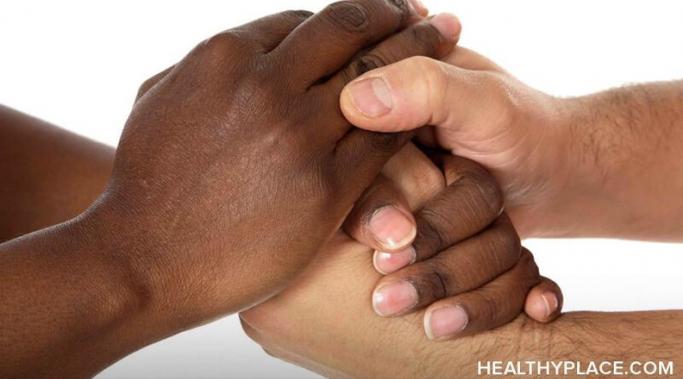I’ve written about this several times, but never said it quite this directly: No one is a diagnosis. No one fits the criteria for “bipolar” or “depression” exactly. No one is a “Patient Like You.” It’s why someone only has to have five out of eight characteristics to be diagnosed with depression. Because there is recognition within the medical community that “depression” isn’t a single thing, much as “bipolar” isn’t a single thing. Those words represent diagnoses that exist along a spectrum.
In writings elsewhere I have suggested what I call a “dimensional” diagnosis. (And this is probably because I’m a computer science-y kind of gal.) Basically you have symptoms and diagnoses that exist along multiple axes. Then, depending on where the dots cluster, you essentially have a Venn diagram of diagnoses.
It’s OK if you didn’t quite follow that. I know. It’s complicated.
But humans are complicated creatures. I like chocolate ice cream, you like vanilla. Humans are a heterogeneous bunch.
Why then, if we understand this, do we have names in the first place? Is the term “bipolar” really even useful?
In short, yes, it is. And yes, we need those labels, even if they are ill-fitting.
Talking About Bipolar
I hate shrinks. Shrinks should die. Shrinks are evil. (Thank the commenters (not an individual) for that.)
OK I get it, you don’t like psychiatrists. Personally, I would find a more intelligent way to express an argument, but your point is clear nonetheless.
You’re ranting. I get that. I rant. We all do. It’s a healthy expression of the frustration seen when dealing with so many things outside of our own control. But at some point you have to stop hating, wishing for murder and committing moral condemnation and actually do something useful.
I get asked quite a bit for specific treatment recommendations. People will tell me a few medication details and then ask what to do, or someone will ask what my experience has been on a certain treatment.
My answer is always the same: only your doctor is qualified to talk to you about your treatment as they know your personal history and health. My experience is only one person’s and cannot be generalized to any other person.
And that is the right answer. But unfortunately, it’s one people don’t want to give (or get).
A clear example is seen on Patients Like Me, a web site designed for patient-to-patient communication.
I take a lot of flak for what I have to say about mental illness. My positions are often blunt and sometimes unpopular. This is fine with me. I’m an opinionated girl. Not everyone enjoys that particular charm.
But one thing that gets said every once in a while is I’m, “playing the victim.” And not only that, but I’m encouraging others to be victims. Contagious victim-ness I suppose.
This, of course, is just a slur designed to make me and others feel bad about what we have to say. Well, I say this:
Admitting to having a mental illness doesn’t mean you’re “playing the victim.” Talking about mental illness isn’t “playing the victim” either.
There are many, many people out there who either blog about issues of mental health or want to. Pretty much every mental illness is represented by people who are earnestly expressing their opinions and experiences.
But it’s a jungle out there, in the wooly wilds of the internet. So before you press “post,” please consider how much you want people to know about you.
I talk to many people who want to help a person with a mental illness. Often the people they want to help are loved ones who have just been diagnosed with a mental illness and those who want to help feel powerless.
The “helpers” have a hard job, but let me just say, we love you for it.
There is a common refrain that if you looked in the DSM, everyone would have some mental disorder. And in point of fact, many symptoms are fairly generic and can be attributed to many. Fatigue, insomnia, thoughts of death, loss of pleasure and weight loss are part of the depression diagnosis.
But the part no one seems to remember is what’s under that,
The symptoms cause clinically significant distress or impairment in social, occupational, or other important areas of functioning.
Last week I waded into Charlie Sheen territory. It was, perhaps, a touch more eel-infested than I had anticipated but life is surprising like that. Yes, I said Sheen is going through a manic episode as part of a mental illness. (And no, I still haven’t become a doctor.) Let’s say for the moment, I’m right.
Since I made my case for compassion for Sheen and mental illness, over scorn and ridicule, people have made the case back that it’s the media’s fault Sheen’s behavior is this out of control.
I don’t think so.
I am lucky enough to have many people out there who love my writing, love my perspective and yes, possibly even love me. Sometimes these people contact me privately, sometimes publically, but either way, I certainly appreciate all the positivity.
On the other hand, there is a small, yet amazingly vocal, number of people who hate what I have to say, and yes, possibly hate me. These people tend to denounce me, and what I have to say, publically.
And honestly, I don’t mind the differing opinions. Disagree with a point I’ve made? No problem, that’s what the comments are for. But zealous, hateful stances on mental illness, treatments and psychiatry tend to hurt those with mental illness far more than it helps.
I’m bipolar. Now wait, before you start to tell me about how “I’m a person with bipolar disorder,” you might want to know, I don’t care. I use the English language in a non-politically correct way. Call it a quirk.
I have a new one for you: I am stalked by bipolar disorder. Kind of like an angry ex-boyfriend for whom you have a restraining order but insists on constantly scaring and tormenting you anyway.

